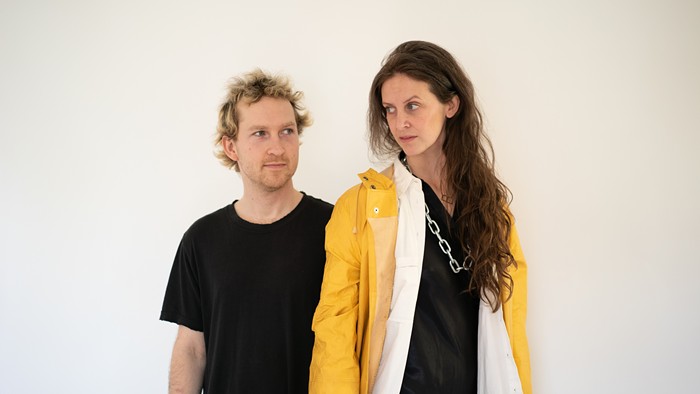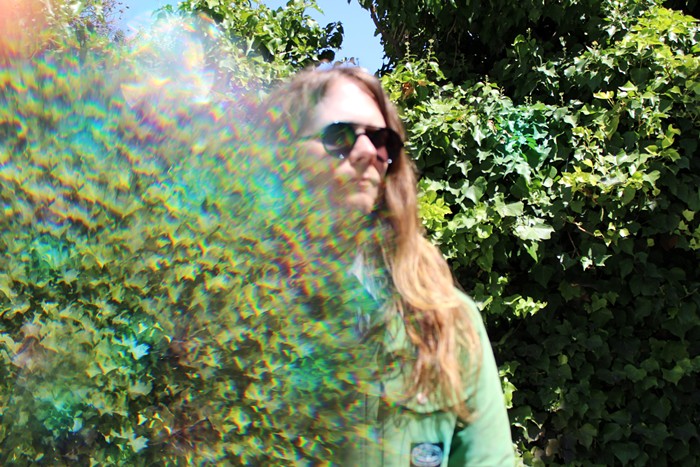But we Geminis know that really, three is not the magic number. Two is. There are two sides to every story, both sides of a coin, and though three people actually make up the band Low, it's two voices harmonizing in a divine unity that best illustrates the amazing beauty their music embodies.
Low was formed in 1993 by Alan Sparhawk and Mimi Parker, and in addition to being the guitarist and the drummer, respectively, they're also co-vocalists (they each have a dual role in the band). As the core of Low (bassist Zak Sally rounds out the roster), they are responsible for the band's unique sound, and the marriage of their voices is perhaps the most prominent aspect of their thoroughly lovely music. And of course, in this double world, where there is one holy union, there is also another: Mimi and Alan are also married. It's an extremely important fact to note when examining why their voices--his scratchy and sensitive, hers high and rich--work so well together. "I think the connotations of a man and a woman singing together in harmony are enhanced if they are indeed close," Sparhawk explains. "Mimi says that it's easy for her to harmonize with me because she's been listening to my voice for all these years and knows my phrasing."
Are you beginning to see where I am heading? The world of Low is a world where two become one, where every component has an important, complementary opposite. Where there is quiet, there is loud; where there is weakness, there is strength; where there is clarity, so there is mystery. Over the course of their five albums, beginning from 1994's I Could Live in Hope to this year's Things We Lost in the Fire (Kranky), Low have cultivated a sound like no other. Subdued, sublime, and often subliminal, it's a distinctively slow and soft approach to making music that will have the hardest impact. One technique for a second effect.
"We built this band on restraint," Sparhawk says. "We have always had an unwritten rulebook that directs how we do things most of the time--mostly centering around minimalism, quiet, slow, etc."
A typical Low song contains only the most essential of elements--a hint of drums, a glacially paced bass line, a subtle strum. It's by showing you as little as they can that Low displays the most revealing picture, and where other bands may see boundaries, they see the pathway to freedom. "I think this restraint has served us well over the years," Sparhawk continues, "by squeezing things out of us we wouldn't have imagined."
Unfortunately, with such a unique approach, there are also bound to be people who just don't get it. And though Alan says, "Sometimes misconceptions are good," he also doesn't quite get the skeptics who think Low's a bit too downbeat. "We're happy. What makes them think we're not?"
For to see Low as ashen-faced saddoes is, as always, to only be looking at one part. A song like the "Sunflower," the opener on Things We Lost in the Fire, gathers its impact by combining darker images with lighter ones, death giving way to redemption, as the titular sunflower melds with the night and establishes harmony (that word again). And truly, isn't the focus of sad music to bring about an empathic joy? (If you said "yes," ask the same question of your significant other; if they say "no," leave them now.)
If you don't believe me, come out and see Low live. You can witness how Low fans gather together to spend some intimate time alone with the music they love (in a sense, putting to practice the lesson learned from the band). Of course, such splendid events are only possible because of the days when Low's path of least resistance garnered the most resistance. ("Our first years were spent playing to mostly unreceptive audiences," Sparhawk remembers. "It was in some ways fun, in a punk rock way.") But Low wouldn't be the experience they are if first they weren't the total opposite.
It's the magic of twos--getting something from nothing, pulling the best out of the worst, getting the greatest high from the greatest Low.


















